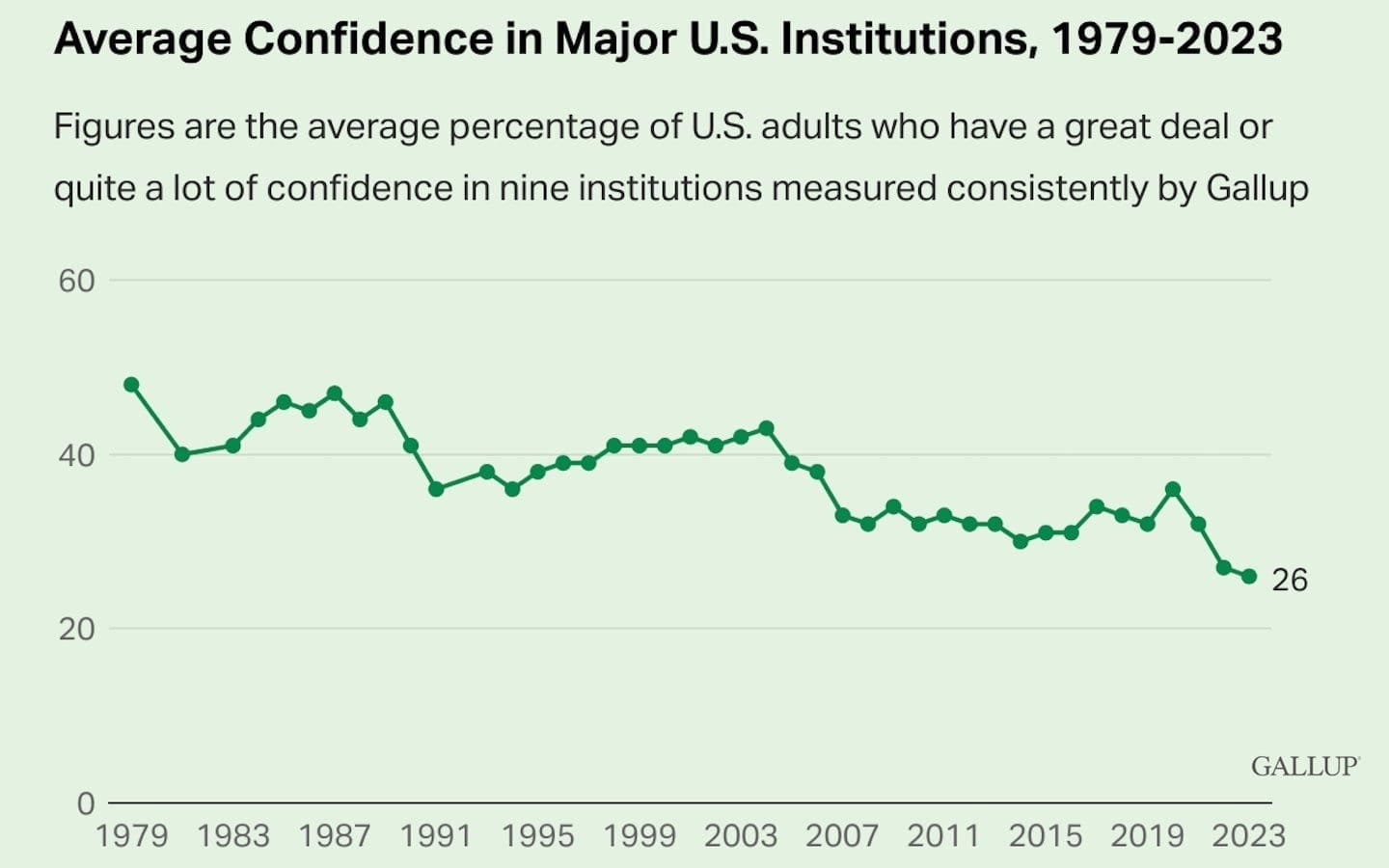Democrats' Institution Trap
President Trump's reckless disruption of Washington taps into America's distrust of institutions. Democrats must resist him without defending institutional status quo.
Convulsions is a reader-supported newsletter for and about you — “A witness to change in an age of acrimony” reading essays on politics, communications, culture, and life. First-level subscriptions are free. If you value the written word and want greater access plus twice the content, choose a paid subscription: $5/month or $50/year. Or be a Concierge Member for $500. Click the orange button for Paid and Concierge benefits.
Read about me and my return to writing here.
The handwringing over President Trump’s assault on U.S. institutions tends to overlook the fact that Americans have been losing faith in them for years — in large part because those social systems have failed to adapt to the needs of people.
Actually, he may be on to something.
Courts, prosecutors, cops, bankers, journalists, politicians, foreign alliances, big businesses, public education, organized labor, the U.S. military, and immigration traditions — these and other institutions or institutionalists were revered by Americans for most of the 20th century, until their measures of trust began a steady decline in the 1960s.
It’s not just that the institutions are corrupt or broken; those clichés oversimplify an existential problem: With few notable exceptions, the nation’s onetime social pillars are ill-equipped for the 21st century. They are failing to help Americans navigate wrenching economic, technological, and demographic change.
Trump is attacking these institutions in ways ranging from unsettling to unconstitutional. Awe-inspiring to autocratic. And he’s laying a trap for Democrats, hoping they stumble into defending institutional status quo.
I say this not to defend Trump. I’m no fan. I say this to help The Opposition understand the error in overreach. Overheated or faux outrage in defense of unpopular institutions is out of step with the times.
Even for those voters repelled Trump’s machinations, there’s often something appealing in the change he espouses — if not with a popular policy like sealing the U.S. border, often with the general direction of disruption.
Democrats would be wiser to position themselves as reformers — positive populists who disrupt the same institutions Trump does, but rather than doing so for self-aggrandizement, as the president does, act on behalf of the whole country.

In a story headlined “The gutting of American institutions has led to Trump gutting America itself,” Washington post columnist Philip Bump catalogues some Trump's more onerous institutional attacks. I added a few of my own.
Firing federal watchdogs in an apparent violation of the law.
Rolling back decades of diversity, equity, and inclusion policies.
Releasing meme coins, a personal crypto grab worth billions of dollars on paper.
Firing career prosecutors who supported two investigations into Trump by independent prosecutor Jack Smith.
Forcing unqualified Cabinet nominees on a pliant Congress, including some determined to dismantle the agencies they may lead.
Freezing federal grants to fight diseases.
Freezing a broad swath of federal grants and loans, causing confusion and panic among organizations that rely on Washington for their financial lifeline.
Offering buyouts to federal employees in a sweeping effort to shrink government.
This list is nowhere near exhaustive because Trump’s exhausting pace has challenged the ability of journalists and other watchdogs to keep track. The point is, he inherited a weakened social infrastructure ripe for the abuse. As Bump put it:
The scale of institutions makes it easy to find or invent flaws that allow for trust to be eroded; and the internet has been a particularly effective solvent. Less confidence in institutions makes people less likely to contribute their time and energy, lessening institutional power. It opens the door for that power to be peeled away, for other organizations or people to assert that they are better vehicles for the same effort — though their power is almost always significantly more modest.
All this brings to mind a cover story I wrote for the National Journal magazine in 2012, “In Nothing We Trust, centered on a man named Johnny Whitmire. I met Johnny in a Muncie, Ind., courtroom where he was fighting a city fine for unkept grass at a home his bank had taken away. He was the avatar for a story examining the collapse of once-trusted local institutions: churches, City Hall, schools, and the town newspaper. Muncie was an avatar for the country.
Whitmire is an angry man. He is among a group of voters most skeptical of President Obama: noncollege-educated white males. He feels betrayed—not just by Obama, who won his vote in 2008, but by the institutions that were supposed to protect him: his state, which laid off his wife; his government in Washington, which couldn’t rescue homeowners who had played by the rules; his bank, which failed to walk him through the correct paperwork or warn him about a potential mortgage hike; his city, which penalized him for somebody else’s error; and even his employer, a construction company he likes even though he got laid off. “I was middle class for 10 years, but it’s done,” Whitmire says. “I’ve lost my home. I live in a trailer now because of a mortgage company and an incompetent government.”
Whitmire died before he could vote in the 2016 election, but I have little doubt he would have swung to Trump. He reminds me of every Trump voters I’ve ever interviewed —Democrats-turned-MAGA after their lives were disrupted by change, mocked and ignored by their ancestorial party. In 2015, when I was warning Democrats that Trump might win, I dubbed them “Crazy Buts.”
From Detroit, where my family lives, to northern Michigan, where my family vacations, I heard Republicans, independents, and even Democrats begin sentences this way: "Donald Trump is crazy, but..."
"Crazy, but he's a winner, and I'm tired of America losing."
"Crazy, but he can't be worse than what we got."
"Crazy, but he's punishing the establishment."
"Crazy, but he's driving the media nuts."
"Crazy, but he says what I can't say."
Most don't mean “crazy” in a clinical sense. “Crazy as in crass,” a landscaper from rural Michigan told me in mid-July. “I’m not sure he has the temperament to be president, but I like how he’s messing with your minds in Washington. Crazy like a crash-test dummy.”
A decade later, Trumps is more empowered and politically resourceful than ever, and Democrats need to adjust to this inconvenient truth: He may be crazy like a fox. Resist him, yes, but don’t reward him.





I would argue that Biden worked within the existing political construct to get done what 50% of country (including you and me) supported. What he didn't do is acknowledge the public's widespread frustration with political and social institutions, much less seek to adapt them to the times. He let Trump be the sole populist in the election, the only change agent. Dems need to seize the change mantle. To co-opt Bush's "Reformer with Results" slogan, Trump and his ilk are a Reformers with Revenge. Democrats must counter as reformers with a heart.
Sclerotic institutionalism is what doomed the Democrats during Biden's term. In Ukraine, in Gaza, in the criminal courts trying to hold Trump accountable.
The Republicans rolled up all the unpopular institutionalism supported by the Democratic Party in their 2024 "they/them" campaign ad, the most devastating political ad since Willie Horton.